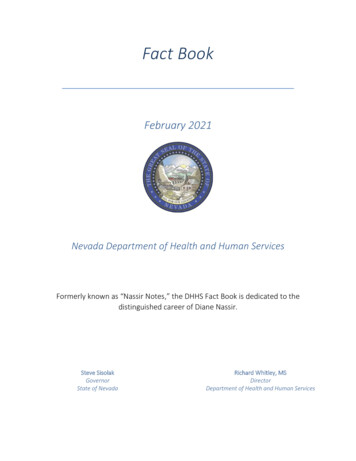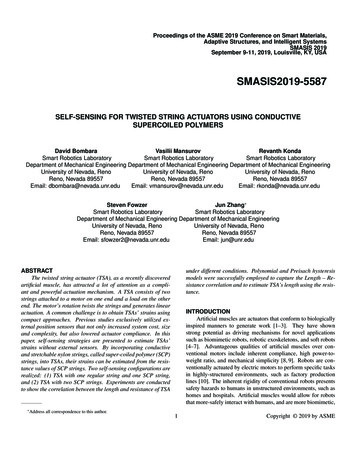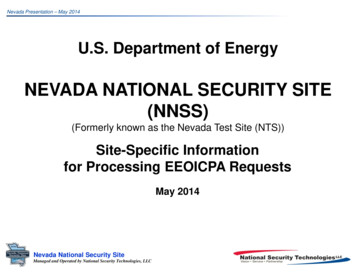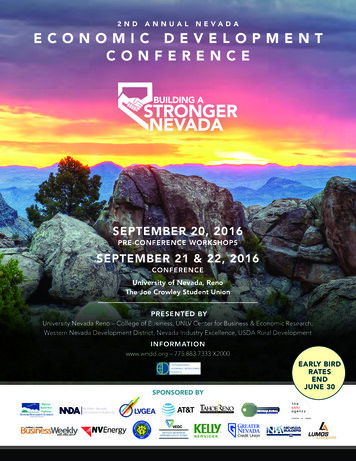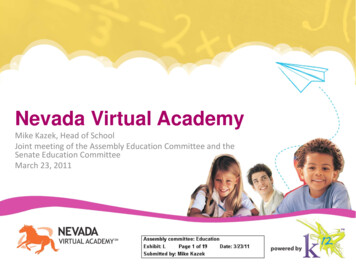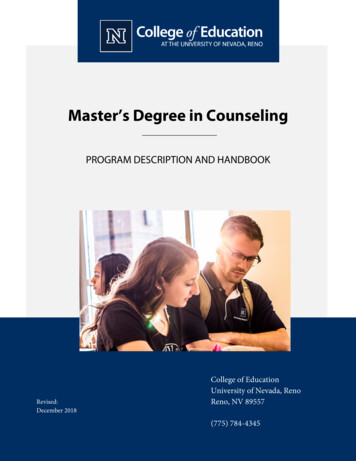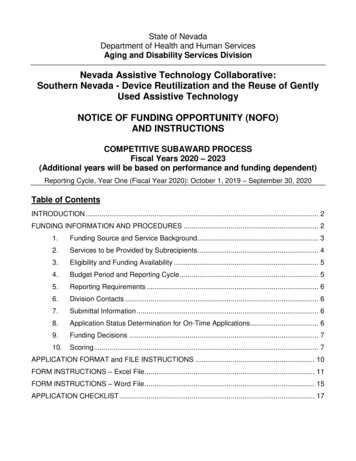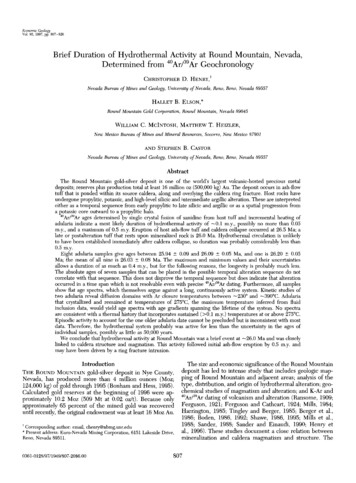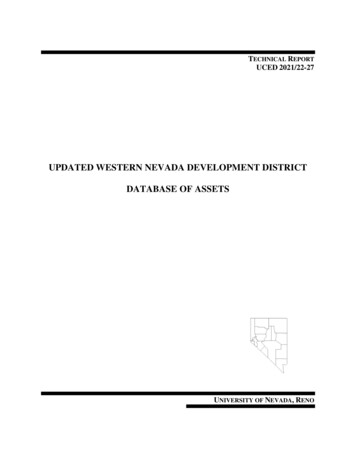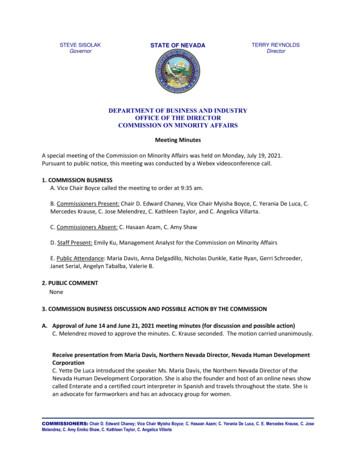
Transcription
STEVE SISOLAKGovernorSTATE OF NEVADATERRY REYNOLDSDirectorDEPARTMENT OF BUSINESS AND INDUSTRYOFFICE OF THE DIRECTORCOMMISSION ON MINORITY AFFAIRSMeeting MinutesA special meeting of the Commission on Minority Affairs was held on Monday, July 19, 2021.Pursuant to public notice, this meeting was conducted by a Webex videoconference call.1. COMMISSION BUSINESSA. Vice Chair Boyce called the meeting to order at 9:35 am.B. Commissioners Present: Chair D. Edward Chaney, Vice Chair Myisha Boyce, C. Yerania De Luca, C.Mercedes Krause, C. Jose Melendrez, C. Kathleen Taylor, and C. Angelica Villarta.C. Commissioners Absent: C. Hasaan Azam, C. Amy ShawD. Staff Present: Emily Ku, Management Analyst for the Commission on Minority AffairsE. Public Attendance: Maria Davis, Anna Delgadillo, Nicholas Dunkle, Katie Ryan, Gerri Schroeder,Janet Serial, Angelyn Tabalba, Valerie B.2. PUBLIC COMMENTNone3. COMMISSION BUSINESS DISCUSSION AND POSSIBLE ACTION BY THE COMMISSIONA. Approval of June 14 and June 21, 2021 meeting minutes (for discussion and possible action)C. Melendrez moved to approve the minutes. C. Krause seconded. The motion carried unanimously.Receive presentation from Maria Davis, Northern Nevada Director, Nevada Human DevelopmentCorporationC. Yette De Luca introduced the speaker Ms. Maria Davis, the Northern Nevada Director of theNevada Human Development Corporation. She is also the founder and host of an online news showcalled Enterate and a certified court interpreter in Spanish and travels throughout the state. She isan advocate for farmworkers and has an advocacy group for women.COMMISSIONERS: Chair D. Edward Chaney; Vice Chair Myisha Boyce; C. Hasaan Azam; C. Yerania De Luca, C. E. Mercedes Krause, C. JoseMelendrez, C. Amy Emiko Shaw, C. Kathleen Taylor, C. Angelica Villarta
Ms. Maria Davis, said she is originally from Northern Mexico in a very small farming village. She isthe first director for the farmworkers in Nevada through the Oregon Human DevelopmentCorporation. The Nevada Human Development Corporation is composed of her and an outreachcoordinator. At her job as a certified court interpreter, she met a migrant worker outreachcoordinator and learned about migrant workers in the area. Later on, a person contacted herbecause she saw some really bad things on a farm, and their rights as H2A visa workers were notbeing respected. They had no voice and no one would ever said anything because there was alanguage barrier or they were afraid, even if they were legal to work here. In some cases, peoplewould retain their passports so workers could not leave and they did not what rights they had in thiscountry. Last March, she received a call inviting her to an organization that was just forming, theNevada Farm Workers Resource Council. She said she could give her perspectives of this, and whileattending the meeting, she realize she has eyes in many places that other people don’t because theyfocus on that one area. She also learned from interpreting at the courts that the dairy workers wereafraid to lose their jobs. They would rather face warrants than face their boss. She got involved inNevada Farm Workers Resource Council, and realized that in Nevada, we officially do not have anyfarms other than the ones that employ H2A visa workers.Outreach in our state is really different, you drive a few miles to get to a home and the next one ismiles away. In Oregon, you would go to one area and find hundreds of workers. Ms. Davis becamethe Director because having this title would help her advocate for them. A lot of the rights of theworkers are being denied. As the Director, she communicates with the Outreach Coordinator toknow what is needed to provide those services to the farmworkers. That is not enough, becauseonly person doing the outreach. Other organizations in Oregon have so many resources. They aredoing a study to see what resources are needed, and we don’t have that in Nevada. Because manyof the farmworkers are undocumented, during the pandemic they were denied the most basic aid.The farmworkers are extremely important because without them, we would have no food and wewould not exist. Why have we treated the farmworkers as if they were still coming from Mexico?We think that just paying a little more than at home would be enough, but we know that is not thecase. Changing laws is how we need to approach this, but also bring in the farm owners because wewant them to continue farming the land. We need to be providing them with fair wages and housingfor the H2A visa workers. Nevada Human Development Corporation (NHDC) can only work withworkers who are legal. However, we cannot pretend that the others don’t exist and ignore the factthat they are overworked. We need legislation that we need to give them water, and they shouldnot be working outside when it is extremely hot outside. It should be common sense. Theirconditions are inhumane. Why is it that the law specifically state that the farmworkers cannotunionize. State by state, legislation is being passed to provide overtime pay and basic services. Oneworker took advantage of the services of NHDC and decided to take and go and get a trade. He wentfor training and started making 18 an hour, but still not enough with the increase in the cost ofliving. If we don’t give farmworkers incentives, we will not have anyone to work on the farms.NHDC offers training in Spanish or even other dialects, English as a second language classes, on thejob training, placement for other jobs, counseling and case management. The success stories thatwe have are people who take advantage of training and learning other trades.C. De Luca asked if Ms. Davis knew the number of farmworkers and farms. Ms. Davis said thatinformation doesn’t exist, and they are working to compile that information. According some of thecities in Nevada, Ms. Davis said the annual salary of farmworkers is 29k but she believes thosesalaries are from those managing the farms from far away. Ms. Davis said something tragichappened in Yerington, and she was able to see the conditions in which the workers were beingkept in. Ms. Davis said now there’s been a huge improvement in their housing but conditions are stillCOMMISSIONERS: Chair D. Edward Chaney; Vice Chair Myisha Boyce; C. Hasaan Azam; C. Yerania De Luca, C. E. Mercedes Krause, C. JoseMelendrez, C. Amy Emiko Shaw, C. Kathleen Taylor, C. Angelica Villarta
not ideal. She believes half of the farmworkers are undocumented, but they are afraid to speak upabout their living conditions. She said we need to do work on the immigration side of the house.C. Krause asked if she could share any educational needs of the children of the workers. Ms. Davissaid that one of the barriers that they face in the rural areas is that their parents don’t have time tohelp them. Some of them don’t have the knowledge or know English. She has seen that the kidsdon’t go to work once they start driving because they have to drive their parents and they miss somuch school. She thinks attendance has been an issue, and also having the support at homebecause we know teachers can’t do everything. It’s a team effort. Some of the parents come here,and they are so happy with running water. That is luxury with where they come from, and there areso many opportunities here that they just don’t know. In the rural areas, they don’t have access toall of the resources. C. Krause asked if the school districts are responding. Ms. Davis said there is amigrant worker outreach person and they try to communicate with all the parents and do homevisits. In her opinion, the parents just don’t realize that getting here is just half the dream. There aremore things available for their kids.C. Taylor asked what are the conditions of farm work. Ms. Davis said she just started this positionand still setting up meetings. Agriculture is considered a very dangerous industry because of all thechemicals and don’t have protections of other industries. C. Melendrez asked what health care islike for the workers. Ms. Davis said there are no health care. Passing the public option plan was astarting point but they don’t have actual medical care and providers are leaving out state. They alsodon’t have vacation or sick leave. They don’t get paid if they’re sick. C. De Luca said the NevadaFarm Workers Council has been working with the University of Nevada, Reno School of Medicine topprovide clinics on a regular basis. Also, the Nevada Health Care centers have expanded to Elko andWinnemucca to offer services and are not requiring identification. There are some transportationand scheduling problems, but there are attempts to provide health care there. Ms. Davis said thatthe people still aren’t trusting of the clinics, so they have to get the word out that there are thoseclinics.B. Subcommittee Updates (for discussion and possible action)1. Community LiaisonC. Villarta said that LVMPD (Las Vegas Metro Police Department) is resuming its first Tuesday events.Also, the Asian Community Resource Center is hosting free senior citizen driving and computerclasses with AARP seniors. They are offering free immigration classes like American history for theimmigration process as well. C. Villarta said that this Saturday the Sri Lanka Association of Las Vegaswill be hosting a huge community picnic. There will be 11 Asian and Pacific Islander communitiesrepresented at the event. They have free vendor tables, and she will be hosting the main stage. Alsofalling in line with Henderson Redevelopment Agency’s area, so command centers and firedepartment will be there as well.M. A. Ku said that C. Azam plans to attend the Sheriff’s Outreach Committee later today.2. LegislativeC. Boyce and M. A. Ku met with staff from Senator Jacky Rosen’s office and appreciate their support.C. Boyce shared what the Commission was doing and our priorities, and welcomed them to sharefuture updates with the Commission if there are items or activities that the Commission couldsupport. On June 24, she represented the Commission at the Southern Nevada InfrastructureCOMMISSIONERS: Chair D. Edward Chaney; Vice Chair Myisha Boyce; C. Hasaan Azam; C. Yerania De Luca, C. E. Mercedes Krause, C. JoseMelendrez, C. Amy Emiko Shaw, C. Kathleen Taylor, C. Angelica Villarta
Working group meeting. No action during the meetings have been made yet, and they have beeninformative presentations up until now. C. Boyce said the four bills that the Commission voted tosupport all passed.3. Economic and Business DevelopmentC. Villarta said she has been working with the Asian Chamber of Commerce hosting Asian culturalcompetency classes for executives. They have given presentations to NV Energy, Sunrise Hospital,and to the Cosmopolitan. It’s a brief presentation of AAPI history and the understanding AAPIcontributions to Nevada followed by a panel discussion, and is usually an hour long. It helps themunderstand from an employer perspective, and also what might be going on with their employees. Ifany corporations are interested, they are presenting for free right now. There are no writtenmaterials yet but that is under development. C. Villarta said that the Federal Reserve Bank has 9people in Nevada in a cohort in the Reinventing Our Communities program, and she was selected toparticipate in the program. They program focuses on centering racial equity and small businesssupport in the COVID-19 recovery, financing for small business BIPOC owners, small businessownership as household and community wealth building, and building equitable and sustainableeconomies. She will share updates as they move forward, as it just launched a few weeks ago. OnJuly 12, C. Villarta said the Governor highlighted the end of the PETS grant, helping almost 9,000businesses and non-profits, which helped them make payroll and keep the doors open through thepandemic. C. Villarta said that the Water Street Business Association has rebranded to developdowntown Henderson to become a destination spot for Nevadans and tourists. They are offeringsmall businesses free membership until the end of the year. There are also offering free video clipson their website to promote small businesses.C. Taylor and C. Boyce presented to Las Vegas City Council meeting on July 7th to talk about theiractivities in the innovation and tech sector. On July 15th, C. Taylor attended a presentation by ClarkCounty Director of Community Relations Shani Coleman to the Clark County Commission meetingabout the needs of Clark County for small businesses as it relates to the American Rescue Plan Act.She collectively had 1-on-1 conversations with 12 representatives from different agencies and smallbusiness sector and got their feedback to pull into this report. C. Taylor was invited to speak as aresource partner. The report was very supportive of the needs of small businesses.C. Boyce attended the Las Vegas Stadium Board Authority meeting on July 15th, which is generally aquarterly update on economic opportunity and general operations and concessions. They sharedupdates on recent events, and the parking took the focus in light of recent events, but they areoften providing updates on opportunities for the stadium as well.C. Krause said RES 2021 (Reservation Economic Summit) is July 19-21 and it’s an annual conferencefor enterprise and economic development for tribes, local organizations, and entrepreneurs. Someof the events and some of the sponsors. The conference is also virtual at http://res.ncaied.org.4. Workforce DevelopmentC. Villarta said there is still a shortage of educators. Clark County is once again bringing special needseducators from the Philippines. The community welcomed 105 special education teachers from thePhilippines. They have some programs to fast track local teachers but it’s still a 3 year process andthey don’t have the capacity. We need to develop more educators to help with special needs. SheCOMMISSIONERS: Chair D. Edward Chaney; Vice Chair Myisha Boyce; C. Hasaan Azam; C. Yerania De Luca, C. E. Mercedes Krause, C. JoseMelendrez, C. Amy Emiko Shaw, C. Kathleen Taylor, C. Angelica Villarta
also said nursing is still facing shortages. Minority nurses make up 9.9% of RNs, and they are gettingburnt out.C. Taylor said a DETR (Department of Employment, Training, and Rehabilitation) reported that as ofMay of this year, Nevada’s seasonally adjusted unemployment rate was 7.8%, down from 24.5%compared to last May. Unemployment rate were 8.9% in Las Vegas, 4.5% in Reno, and 5% in CarsonCity as of May 2021. On the upside, as of July 15th, Nevada added back 15,400 jobs as the statecontinues to recover. The number of jobs remain below typical levels but they are up by 138,700since June of last year, an increase of 11.6%. Carson City increased by 1,100 jobs since June 2020,Reno employment increased by 800 jobs since May, and an increase of 19,500 jobs since June 2020.Las Vegas had an increase of 99,200 jobs since June of 2020. We are definitely on a recovery from aworkforce perspective for Nevada.C. Melendrez said with the Nevada Minority Health and Equity Coalition is working on workforcedevelopment to create pipelines into allied health areas, which is public health, nursing, and medicalschool. They were awarded a small grant and will work on development of those pipelines over thenext two years.5. HousingC. Taylor said that Nevada Treasurer Zach Conine detailed the 50 million rental assistance programfor tenants. This is Nevada’s way of addressing expected evictions for tenants with back rent issuesdue to economic impact of COVID. The program’s goal is to give residential tenants who are overdueon 3 months of rent.On July 15th, C. Boyce attended the Southern Nevada Regional Housing Authority meeting, and theyprovided updates on some of the projects, including Choice Neighborhood Implementation grant,which would be for the redevelopment of Marble Manor and surrounding area. They worked withthe City to submit the federal application and are waiting to see if that was funded.6. HealthC. Melendrez said the COVID numbers going in the wrong direction. Most of the folks getting sickare unvaccinated. Some people who are fully vaccinated are testing positive, so they are lookinginto it right now. As of Friday, July 16th, there have been 938 new positive COVID-19 cases TheHealth District for Southern Nevada recommended wearing masks again in public. The NevadaMinority Health and Equity Collaborative is working with Immunize Nevada, and they have beenvery creative with different ways of getting into communities and getting the information out there.They have been targeting the Latino, African American, and Native American community andworking with groups that historically do political ‘get out the vote’ work. They are utilizing theirmodel and providing them with resources and funding for the ‘get out the vaccines’ efforts. They areusing their networks and street savviness to increase opportunities. C. Melendrez has had meetingswith Region IX Office for the Assistant Secretary of Health and FEMA (Federal EmergencyManagement Agency). They are sending around 100 staff members to Nevada to help us addressvaccinations. University of Nevada, Reno School of Medicine Student Outreach General and ChildClinic is offering free medical care and vaccines. The Truckee Meadows Community College ChildCare Center is offering care for infants, toddlers, and preschoolers. The child tax care credit foreligible households is now underway. C. Melendrez said through Immunize Nevada, there areseveral back to school immunization clinics going on. C. Melendrez said he will now be serving asVice Chair with Councilman Brian Knudsen as the Chair on the Southern Nevada Health DistrictCOMMISSIONERS: Chair D. Edward Chaney; Vice Chair Myisha Boyce; C. Hasaan Azam; C. Yerania De Luca, C. E. Mercedes Krause, C. JoseMelendrez, C. Amy Emiko Shaw, C. Kathleen Taylor, C. Angelica Villarta
Community Health Center Board, which is an FQHC (federally qualified health centers). Now that weare going back to school, there are other vaccines that are required. They are going to have aconversation about that, and educate folks about the process about receiving multiple vaccinationsat once. The other big piece is that UNLV (University of Nevada, Las Vegas) is establishing a clinic tooffer free medical services on Saturday in partnership with School of Public Health. That is kicking offsoon.7. EducationC. Villarta said that CCSD (Clark County School District) started their Anti-Racism, Equity, andInclusion taskforce. It’s getting public criticism because of the national discussion on the critical racetheory (CRT) and whether that should or should not be taught in schools. However, this is an antiracism policy that the board has directed the staff to work on. When we mention anti-racism taskforce, we need to let people know it’s not about CRT, it’s about getting our educators culturalcompetency training.C. Krause pulled up the COVID dashboard of CCSD. She said you can look it up by zip code. At thispoint, we have 3,095 COVID cases in the district. This week there were 23 cases because summerschool is in session. She said that Southern Nevada will be accepting 500 Tigray refugee familiesescaping the genocidal war in the Tigray region between Ethiopia and Eritrea. CCSD has beenpreparing for these families, and they give the support such as school clothes and language and inschool support. There is someone who goes to each school. C. Krause said tribal communities andstakeholders are being asked to provide input to the Nevada Department of Education’s AmericanRescue Plan. The application and public comment form was posted online, and she encouragedanyone to fill out the form to share their opinions.Adding to the anti-racism taskforce brought up by C. Villarta, C. Krause said at school boardmeetings around the country, there are vocal people who are against Critical Race Theory eventhough that’s not what is being discussed. The task force is calling for people from all communities.the goal Initiative for leadership for improving instruction, creating more diversity in administrativeposition. C. Krause said there is a focus on leadership focused on creating more diversity inadministration positions. From July 8th meeting, they presented a plan to return to in personinstruction. The guiding principles include safety and wellbeing of all students, equity andaccessibility to learning for all students, and provide different delivery systems because we are notquite out of the pandemic. C. Krause said the Board of Trustees went over the bills that passed –Efficiencies in Education because it gives more time for instruction for students instead of reportingand paperwork. Also an important equity issue is Bridging the Digital Divide. It’s great that ourlegislators considered this. C. Krause said building 13 new schools and replacing 33 schools is also anequity issue, and groundwork started this summer. They also made amendments to grading reformis really important for equity, because it is taking more into account of what they actually know thangetting penalized for attendance issues because they had to help their families. The grading will takeout those elements. C. Krause wanted to bring up a few points from the Washoe County SchoolBoard Meeting that she thought were interesting. The first related to instruction is to ensure allschools are safe, secure, and supportive. They have started to include mental health initiatives intoplace, including telehealth, which is really helpful. There are some places where they don’t havefacilities or available health professionals, so this telehealth piece is very important. Also at theboard meeting, they gave an update on diversity and equity trainings.COMMISSIONERS: Chair D. Edward Chaney; Vice Chair Myisha Boyce; C. Hasaan Azam; C. Yerania De Luca, C. E. Mercedes Krause, C. JoseMelendrez, C. Amy Emiko Shaw, C. Kathleen Taylor, C. Angelica Villarta
C. Melendrez asked if the Commission can put out a public statement about racism and critical racetheory, and these conversations are critical for moving forward in Nevada. These aren’t easyconversations. C. Krause said that maybe the statement of support could be on the school district’santi-racism task force. C. Melendrez said we need to start positioning ourselves in a very publicforum. C. Taylor asked if this needs to be properly agendized. C. Chaney said we will need to look atthe language and get the language approved.C. Melendrez is chairing Nevada System of Higher Education’s EDIC (Equity Diversity and InclusionCouncil). They do a yearly diversity conference, North and South, and everything that has to do withdiversity at the higher education level. This year was UNLV’s turn to chair the committee.C. Management Analyst update (for discussion and possible action)a. Commission updates – There are three Commissioners waiting reappointment, and theLegislative Commission will discuss that agenda item at their meeting on July 28th. Thevaccination posters have been printed and delivered to our community partners. TheDepartment received the videoconferencing equipment on Friday.b. Community announcements – There is a New Market Tax Credit online event July 20th at 9am. That program is housed under the Department of Business and Industry and ourregulator will be speaking on that panel alongside representatives from CDFIs (CommunityDevelopment Financial Institutions). They will be talking about the state of economicdevelopment, how subsidies like the new markets tax credits work, which targetsdistressed areas. On August 13th, there is a LVGEA Perspectives Event.4. NEW BUSINESSC. Chaney proposed adding creating a letter of support as an agenda item.5. PUBLIC COMMENTNone6. ADJOURNMENT Meeting adjourned at 11:10 am Next Meeting: Monday, August 16, 2021 at 9:30 amCOMMISSIONERS: Chair D. Edward Chaney; Vice Chair Myisha Boyce; C. Hasaan Azam; C. Yerania De Luca, C. E. Mercedes Krause, C. JoseMelendrez, C. Amy Emiko Shaw, C. Kathleen Taylor, C. Angelica Villarta
The Nevada Human Development Corporation is composed of her and an outreach coordinator. At her job as a certified court interpreter, she met a migrant worker outreach . Last March, she received a call inviting her to an organization that was just forming, the Nevada Farm Workers Resource Council. She said she could give her perspectives of .
